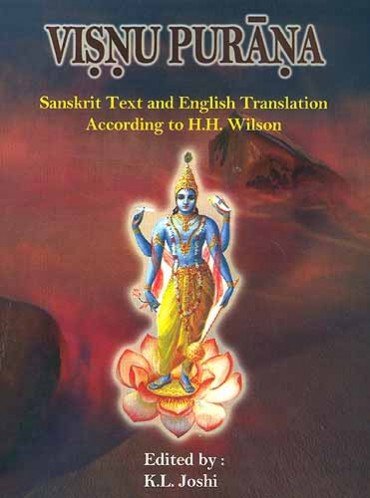The Vishnu Purana
by Horace Hayman Wilson | 1840 | 287,946 words | ISBN-10: 8171102127
The English translation of the Vishnu Purana. This is a primary sacred text of the Vaishnava branch of Hinduism. It is one of the eighteen greater Puranas, a branch of sacred Vedic literature which was first committed to writing during the first millennium of the common era. Like most of the other Puranas, this is a complete narrative from the cr...
Chapter V - Killing of Putana
WHEN Vasudeva was set at liberty, he went to the waggon of Nanda, and found Nanda there rejoicing that a son was born to him[1]. Vasudeva spake to him kindly, and congratulated him on having a son in his old age. “The yearly tribute,” he added, “has been paid to the king, and men of property should not tarry near the court, when the business that brought them there has been transacted. Why do you delay, now that your affairs are settled? Up, Nanda, quickly, and set off to your own pastures; and let this boy, the son whom Rohiṇī has borne me, accompany you, and be brought up by you as this your own son.” Accordingly Nanda and the other cowherds, their goods being placed in their waggons, and their taxes having been paid to the king, returned to their village.
Some time after they were settled at Gokula, the female fiend Pūtanā, the child-killer, came thither by night, and finding the little Kṛṣṇa asleep, took him up, and gave him her breast to suck[2]. Now whatever child is suckled in the night by Pūtanā instantly dies; but Kṛṣṇa, laying hold of the breast with both hands, sucked it with such violence, that he drained it of the life; and the hideous Pūtanā, roaring aloud, and giving way in every joint, fell on the ground expiring. The inhabitants of Vraja awoke in alarm at the cries of the fiend, ran to the spot, and beheld Pūtanā lying on the earth, and Kṛṣṇa in her arms. Yaśodā snatching up Kṛṣṇa, waved over him a cow-tail brush to guard him from harm, whilst Nanda placed dried cow-dung powdered upon his head; he gave him also an amulet[3], saying at the same time, “May Hari, the lord of all beings without reserve, protect you; he from the lotus of whose navel the world was developed, and on the tip of whose tusks the globe was upraised from the waters. May that Keśava, who assumed the form of a boar, protect thee. May that Keśava, who, as the man-lion, rent with his sharp nails the bosom of his foe, ever protect thee. May that Keśava, who, appearing first as the dwarf, suddenly traversed in all his might, with three paces, the three regions of the universe, constantly defend thee. May Govinda guard thy head; Keśava thy neck; Viṣṇu thy belly; Janārddana thy legs and feet; the eternal and irresistible Nārāyaṇa thy face, thine arms, thy mind, and faculties of sense. May all ghosts, goblins, and spirits malignant and unfriendly, ever fly thee, appalled by the bow, the discus, mace, and sword of Viṣṇu, and the echo of his shell. May Vaikunṭha guard thee in the cardinal points; and in the intermediate ones, Madhusūdana. May Ṛṣikeśa defend thee in the sky, and Mahīdhara upon earth.” Having pronounced this prayer to avert all evil, Nanda put the child to sleep in his bed underneath the waggon. Beholding the vast carcass of Pūtanā, the cowherds were filled with astonishment and terror.
Footnotes and references:
[1]:
It is literally ‘went to the cart’ or ‘waggon;’ as if Nanda and his family dwelt in such a vehicle, as the Scythians are said to have done. The commentator explains Śakaṭa ‘the place of loosing or unharnessing the waggon.’ In the Bhāgavata, Vasudeva does not quit Mathurā, but goes to the halting ground of Nanda, who has come to that city to pay his taxes: explained by the comment.
[2]:
In the Hari Vaṃśa this female fiend is described as coming in the shape of a bird.
[3]:
The Rakṣā, the preserver, or preservative against charms, is a piece of thread or silk, or some more costly material, bound round the wrist or arm, with an appropriate prayer such as that in the text. Besides its application to children, to avert the effects of evil eyes, or to protect them against Dains or witches, there is one day in the year, the Rākhī Purnimā, or full moon in the month of Śravan (July—August), when it is bound upon the wrists of adults by friendly or kindred Brahmans, with a short prayer or benediction. The Rākhī is also sent sometimes by persons of distinction, and especially by females, to members of a different family, or even race and nation, to intimate a sort of brotherly or sisterly adoption. Tod's Rajasthan, I. 312.
